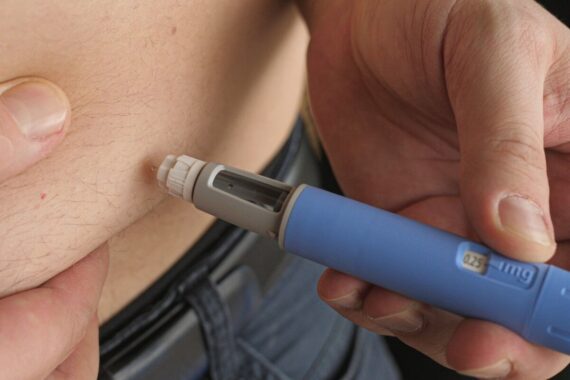GPs will be able to prescribe Mounjaro weight-loss injections from late June to ‘prioritised patient cohorts’ set out by NHS England in new guidance.
NHS England’s ‘interim commissioning guidance’ has stipulated that ICBs must meet the costs of funding access to tirzepatide (Mounjaro) for obesity in primary care settings from 23 June this year.
Provision of the weekly injection in primary care was initially recommended by NICE last summer, but NHS England made a request for a slower, phased rollout of tirzepatide in order to avoid overwhelming GPs.
NICE accepted this request in its final guidance, and instructed the national commissioner to ensure the drug is made available via specialist weight management services within three months, and via primary care within six months.
The NICE guidance also asked NHSE to come up with a more detailed plan of who exactly would be eligible in the first pilot phases, based on clinical need rather than BMI alone.
NHS England has now set out its patient cohort approach, which ‘considers comorbidities as the main qualifier in clinical prioritisation, in association with BMI’ in order to phase access to the drug.

‘The approach to implementation within primary care as a novel care setting for tirzepatide (Mounjaro) in the management of obesity, focuses on managing primary care capacity and enabling access for patients with the highest clinical need,’ NHS England said.
This phased approach will cover the first three years of Mounjaro implementation and the eligible cohort is expected to cover 220,000 patients across both primary care and specialist weight management services.
Any patient prescribed Mounjaro in primary care must also receive wraparound care, which ‘incorporates nutritional and dietetic advice as a minimum and access to behavioural change components’.
NHSE recognised that this will need to be an ‘additional’ service for primary care, unlike specialist weight management services where this care is already provided.
The national commissioner said it will ‘make centrally funded wraparound care services available to all ICBs’ from 23 June for use in primary care, since a wraparound care service specifically for Mounjaro is not ‘viable’ in the short term. The pathway details for this will be confirmed in May.
To cover the costs of implementation, all ICBs will receive a funding allocation based on both the drug costs and the expected workload of setting up the new service within primary care.
The funding calculation will use each ICB’s obesity prevalence rates, and the allocation will be fixed and will not be ring-fenced.
NHS England will also publish a template in June which sets out the approach for capturing ‘essential data’ about patients on Mounjaro within current GP IT systems.
As well as GP practices, NHS England said other potential primary care delivery models included a ‘community/ local based delivery model’ or community outreach by specialist weight management services.
ICBs will have ‘flexibility’ to choose the model best suited to their population, with the ‘aim of growing and scaling these models’ in primary care over the initial three-year period.
Northamptonshire GP Dr Ellen Fallows, who is also vice-president of the British Society of Lifestyle Medicine, said that prescribing Mounjaro in primary care is a ‘useful start to improve obesity care in the NHS’.
But she warned that the ‘workload implications are significant and come at an extraordinarily difficult time for primary care’.
Dr Fallows continued: ‘The longer term support requirements for people with significant obesity and comorbidities who take these medications are likely to include complicated and protracted deprescribing alongside nutritional needs and side effects including biliary disease and pancreatitis.
‘No one has yet modelled the potential impact of these on primary care teams nor considered the risks for these groups who often have significant comorbidities, risky polypharmacy and complex psycho-social needs.’
In January, NHS England told GPs not to prescribe tirzepatide for weight loss until advised to do so by their local ICB, since they will be designing their own models in line with NICE guidance.
GPs were also recently warned that they could be at medico-legal risk if they ignore requests from private online pharmacies for patient information when prescribing weight-loss medications.
Ahead of the amended rollout plans, around 2.8 million patients would have been be eligible for Mounjaro as the initial NICE recommendations stood, meaning the rollout could have taken up 18% of GP appointments, according to NHSE calculations.














How much will we be paid for taking in this work?
I bet there will be no extra payments. GPs will be told to just get on with it, and the money will be in the global sum. I predict the wraparound care provided by the ICB will be non existent or a 2 yr waiting list. Also what happens when there is an inevitable Mounjaro shortage?
GPs should be paid equivalent of hospital OP services to do this or refuse. Just do not have the capacity.
And the Dimbleby report; fast food, junk food tax and the rest to tackle the horrendous diet that is fuelling the obesity crisis?
Nothing of course. Medicalise it, pay God knows how much to the pharmaceutical industry and put people on injections for the rest of their lives because as soon as they stop there is rebound weight gain.
A joke.
‘Your illness is caused by your poor lifestyle’
‘Do I need to change my lifestyle, doctor?
‘ no, here’s a pill’